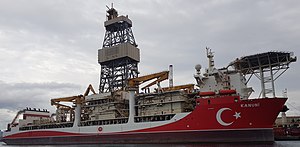
Natural gas supplies over a quarter of Turkey's energy.[2][3] The country consumes 50 to 60 billion cubic metres of this natural gas each year,[4][5] nearly all of which is imported. A large gas field in the Black Sea however started production in 2023.[6]
After the 2022 Russian invasion of Ukraine several European countries stopped buying Russian oil or gas, but Turkey's relations with Russia are good enough that it continues to buy both.[7][8] Turkey receives almost half of its gas from Russia.[5] As of 2023[update] wholesale gas is expensive and a large part of the import bill.
Households buy the most gas, followed by industry and power stations.[9] Over 80% of the population has access to gas,[10] and it supplies half the country's heating requirements.[4] As the state owned oil and gas wholesaler BOTAŞ has 80% of the gas market,[2]: 16 the government can and does subsidize residential and industrial gas consumers.[11] All industrial and commercial customers, and households using more than a certain amount of gas, can switch suppliers.[2]
- ^ Kulovic, Nermina (4 February 2022). "Turkish drillship wraps up all planned well tests on Black Sea gas field". Offshore Energy. Retrieved 2 March 2023.
- ^ a b c IEA (March 2021). Turkey 2021 – Energy Policy Review (Technical report). International Energy Agency. Archived from the original on 7 March 2022. Retrieved 19 December 2021.
- ^ "Energy consumption by source, Turkey". Our World in Data. Retrieved 2 August 2022.
- ^ a b "A Cold Winter: Turkey and the Global Natural Gas Shortage". Centre for Economics and Foreign Policy Studies (Edam). 6 October 2021. Archived from the original on 17 December 2021. Retrieved 19 December 2021.
- ^ a b "Ukraine War Complicates Turkey's Gas Challenge". Energy Intelligence. 9 March 2022. Retrieved 7 July 2022.
- ^ "Can Sakarya pave the way for Turkey's gas independence?". IHS Markit. 25 April 2023. Retrieved 29 September 2023.
- ^ Cite error: The named reference
:22was invoked but never defined (see the help page). - ^ Cite error: The named reference
:23was invoked but never defined (see the help page). - ^ Ergur, Semih (5 June 2022). "Increasing Usage of Natural Gas in Turkey and Its Effect on Local Economy". Climate Scorecard. Retrieved 14 July 2022.
- ^ 2021 Natural Gas Distribution Sector Report (PDF). Natural Gas Distribution Companies Association of Turkey (GAZBİR) (Report). Archived from the original (PDF) on 14 July 2022. Retrieved 14 July 2022.
- ^ Coskun, Orhan (31 March 2022). "Turkey may hike April industry, power plant gas prices more than 20% -sources". Reuters. Retrieved 14 July 2022.